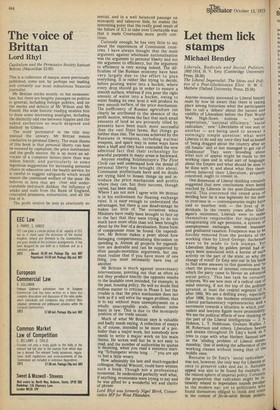The voice of Brittan
Lord Rhyl
Capitalism and the Permissive Society Samuel Brittan (Macmillan £3.95) This is a collection of essays, some previously published, some not, by perhaps our leading and certainly our most industrious financial journalist. Mr Brittan sticks mostly to his economic lase, but there are lengthy passages on politics in general, including foreign politics, and on the merits and defects of Mr Wilson and Mr Powell. His wide historic reading enables him to draw some interesting analogies, including the distinctly odd one between hippies and the naked anchorites so much despised and disliked by Gibbon.
The word 'permissive' in the title may mislead the unwary. Mr Brittan means conducive to personal liberty. The main theme of this book is that personal liberty can best be ensured by capitalism, the price mechanism and the profit motive. He is no more an advocate of a complete laissez-faire than was Adam Smith, and particularly in some ingenious suggestions for increasing personal choice in education and the health service, he is careful to suggest safeguards which would ensure the continued welfare of the poor. He believes in laws that are clear and understandable and much dislikes the influence of winks and nods from the Bank of England, concealed pressures, exhortation, and all the rest of it.
The profit motive he sees as absolutely es sential, and in a well balanced passage on monopoly and takeover bids, he makes the interesting point that the really good.result of the failure of ICI to take over Courtaulds was that it made Courtaulds more profit contious.
Curiously enough, he has very little to say about the experiences of Communist countries. I have always thought that the main argument against wholesale nationalisation Was the argument to personal liberty and not the argument to efficiency, but the argument to efficiency is very strong indeed. The difficulties of the Russian economy have been very largely due to the effort to plan everything. It is rather like trying to decide, before pouring water into a bucket, where every drop should go in order to ensure a smooth surface, whereas if you pour the right amount of water into a bucket, owing to water finding its own level it will produce its own smooth surface, of the price mechanism. The inefficiency of Russian agriculture can clearly be attributed to the absence of the profit motive, witness the fact that such small amounts of land as are privately tilled by peasants have been much more successful than the vast State farms. But things go further than this. The success achiek/ed by the Russians in weapons, including nuclear weapons, and space may in some ways have been a bluff and they have concealed the now admitted fact that their technology for peaceful purposes in many areas is backward.
Anyone reading Solzhenitsyn's The First Circle can well understand how the denial of personal liberty has brought this about. Communist intellectuals have and no doubt are trying hard to loosen things up and introduce the price mechanism and profits where they can, but their success, though varied, has been small.
Where I am not sure I agree with Mr Britten. is in his enthusiasm for floating exchange rates. It is easy enough to understand the advantages, but there is one disadvantage he makes too little of. The occasions when Ministers have really been brought to face up to the fact that they were trying to do too much have more often than not been brought about by the fear of a devaluation. Some form of compromise must be found. On expenditure, Mr Brittan makes a point about how damaging compartmentalising discussion on spending is. Almost all projects for expenditure are desirable and can be supp6rted by often pseudo-moralistic arguments, but one must realise that if you have more of one thing, you must necessarily have less of another.
Mr Brittan is much against unnecessary interventions, pointing out that as often as not they produce exactly the opposite results to the laudable ones intended, for example, in the past, housing policy. He will no doubt find endless matter to criticise in Phase 3, but the trouble is that the price mechanism does not look as if it will solve the wages problem, that is to say without mass unemployment on a wholly unacceptable scale, without some basis in law. This is due to the monopoly position of the trade unions.
Much of what Mr Brittan says is valuable and badly needs saying. A collection of essays is, of course, intended to be more of a potboiler than a major work, but somebody now needs to write a major work on his main theme. He writes.well but he is not easy to read, and the number of authorities he quotes is daunting, when you read a sentence starting "Schumpeter wrote long ..." you are apt to feel a little weary.
How admirably his late and much regarded colleague, Harold Wincott-, could have written such a book. Though not a professional economist, he understood perfectly well what, if anything, economists were trying to say and he was gifted by a wonderful wit and clarity of phrase.
Lord Rhyl was formerly Niel Birch., Conservative MP for West Flints/tire.


































 Previous page
Previous page